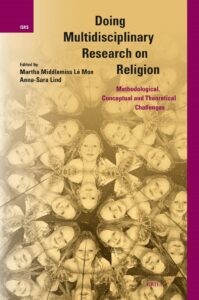Print Matters: Doing Multidisciplinary Research on Religion
A new book entitled "Doing Multidisciplinary Research on Religion. Methodological, Conceptual and Theoretical Challenges" is forthcoming. The title caught our attention, as it seems to be very relevant to researchers in the field of religion. In our Print Matters series we had an interesting interview with editors Martha Middlemiss Lé Mon and Anna-Sara Lind.
Martha and Anna-Sara, you signal that multidisciplinary research is difficult to bring to fruition. Can you mention some challenges in this respect?
I don’t think any academic who has attempted multi (or interdisciplinary research) will be surprised to hear that we think that the main challenge with multidisciplinary research is the need for commitment and engagement throughout a long process. This in itself ought perhaps not to be a major barrier for researchers who have chosen a research field because of their desire to contribute to development of knowledge, but multidisciplinary research is conducted within the framework of modern academia. This with all its pressures such as short term funding, time pressures and lack of recognition for multidisciplinary work means that the extra effort and time that committing to a multidisciplinary research endeavor requires can’t always be found.
Having said this we want to underline that from all that we have experienced the benefits far outweigh the cons and for the researcher who is interested in engaging with other perspectives and willing to make the effort to understand what insights from other disciplines methods and theories can add to their own there are huge gains to be made.
The book’s description promises that you offer concrete tools with which to set about designing and executing multidisciplinary research on religions. Can you mention some of these tools?
We hope that the book can offer tools for different people at different levels. Anders Bäckström’s chapter for example can, for the senior researcher seeking to establish a larger program or research centre, offer a checklist of issues to pay attention to. Anna-Sara’s chapter written with colleagues from other disciplines provides an example of a hermeneutic process used for undertaking a common project where the same material was studied using different disciplinary approaches and methods. We hope that this method (and others in other chapters) might be able to be picked up by researchers embarking on a similar endeavor. Martha’s chapter, written with colleague Cecilia Nahnfeldt provides highlights a number of factors to take into account when undertaking multidisciplinary work in collaboration with partners outside of academia. Here one tool is the importance of identifying goals early in the process and at the same time differentiating between the common goal of the common project and the different goals that the respective partners bring to the table.
What is an important insight you gained in putting this book together that you would like to share?
We have both been engaged in multidisciplinary research for most of our academic lives and were perhaps because of that not really surprised by the most of the insights that our fellow contributors shared in this volume. Having said that one thing we have taken with us is the breadth of multidisciplinary research in the field of studies of religion and the potential it has to enable researchers of religions to reach audiences (both academic and non) and address challenges where religion is an important factor, but perhaps not the central question. As Lori Beaman notes in her chapter societal challenges such as the climate crisis urgently require multidisciplinary approaches if their complexity is to be understood and solutions found that can be of use to those trying to implement change. This volume is an attempt to contribute to that development and we hope enable more researchers interested in religion to see how and where their research can contribute in dialogue with other perspectives.
***
Thank you so much for this interview, Martha Middlemiss Lé Mon, and Anna-Sara Lind!

Martha Middlemiss Lé Mon, PhD Theology. (b 1978), Uppsala University, is director of the Centre for Multidisciplinary Research on Religion and Society (CRS) at that university. Her research focuses on religion and welfare in contemporary Europe including an interest in issues of gender, civil society and values.

Anna-Sara Lind, LL.D. (b 1977), Uppsala University, is Professor of Public Law at that university. Her research focuses on public law, EU law and fundamental rights and on how EU law and international law interacts in the fields of welfare state law in a complex constitutional reality.
